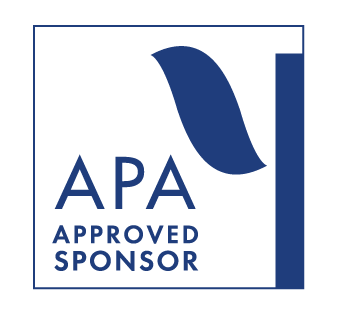April 2024: Webinar Series About the Brain and the Mind
Each webinar takes 3 hours and 3 CE Credits will be awarded for every live webinar by CE credit sponsor to licensed professionals.
 CUE Management Solutions, LLC is approved by the American Psychological Association to sponsor continuing education for psychologists. CUE Management Solutions, LLC maintains responsibility for this program and its content.
CUE Management Solutions, LLC is approved by the American Psychological Association to sponsor continuing education for psychologists. CUE Management Solutions, LLC maintains responsibility for this program and its content. CUE Management Solutions, LLC is recognized by the New York State Education Department’s State Board for Psychology as an approved provider of continuing education for licensed psychologists #PSY-0242.
CUE Management Solutions, LLC is recognized by the New York State Education Department’s State Board for Psychology as an approved provider of continuing education for licensed psychologists #PSY-0242.Instructor Credentials: Elkhonon Goldberg, Ph.D., ABPP., a clinical neuropsychologist and cognitive neuroscientist, and Diplomate of The American Board of Professional Psychology in Clinical Neuropsychology. His critically acclaimed and bestselling books have been translated into 24 languages.
Tuition: $165
Format: three-hour long online webinar
Date:
1. Forensic Issues in Neuropsychology: Brain Disorders and Criminal Behavior, April 4 (Thursday) 1pm-4pm Eastern Time and April 6 (Saturday) 10am–1pm Eastern Time
2. Long NeuroCovid: What has been Learned, April 11 (Thursday) 1pm-4pm Eastern Time and April 13 (Saturday) 10am–1pm Eastern Time
3. Tourette and ADHD: A New Look at an Old Quandary, April 25 (Thursday) 1pm-4pm Eastern Time and April 27 (Saturday) 10am–1pm Eastern Time
4. Executive Dysfunction in Brain Disorders, May 2 (Thursday) 1pm-4pm Eastern Time and May 4 (Saturday) 10am–1pm Eastern Time
Time:
1pm–4pm Eastern Time (noon–3pm Central Time, 10am–1pm Pacific Time)
10am–1pm Eastern Time (9am–noon Central Time, 7am–10am Pacific Time)
(same webinars offered twice, once on a weekday and for the second time on a weekend)
Training appropriate for: The course is intended for professionals concerned with mental health and with brain and brain disorders.
The course content level: Intermediate.
Forensic Issues in Neuropsychology: Brain Disorders and Criminal Behavior
April 4 (Thursday) 1pm-4pm Eastern Time and April 6 (Saturday) 10am–1pm Eastern Time
Various brain disorders may alter behavior in ways that result in behaviors judged by society as antisocial or outright criminal. Ultimately the judgment whether certain acts are criminal and to what extent (if any) a history of brain disorder is a mitigating factor, rests with the legal system. However, mental health professionals can make important contributions to these decisions in an advisory capacity. It is important to educate both mental health professionals and members of the legal profession about the many possible ways in which brain damage may contribute to criminal behavior. Socially aberrant behaviors are more common in certain brain disorders than in others; the manifestations may be different, and so are the underlying mechanisms. In this webinar we will review some of the conditions with which aberrant behaviors may be associated. These include dementias, neurodevelopmental disorders, traumatic brain injury,
seizures, space occupying lesions, neuropsychiatric disorders, and others. It is important for clinicians working with these populations to be aware of the potential for socially aberrant behavior, which may be predicated, entirely or in part, on the intrinsic properties of underlying brain disease and associated cognitive impairment and disinhibition.
Topics to be covered:
Relationship between neuropsychological and legal perspectives.
Frontal lobe dysfunction and aberrant behavior.
Criminal behavior in dementias: frontotemporal (FTD) and others.
Criminal behavior in traumatic brain injury (TBI).
Early life TBI as a risk factor for later-life criminality.
Aggression in temporal lobe epilepsy: real or imagined?
Space occupying lesions: arachnoid cysts and violent psychosis.
Is there a relationship between depression and aggression?
Schizophrenia and violence: is there a link?
Neurodevelopmental disorders: aggression and anger.
Learning objectives for training:
1. Describe the potential for criminal behavior in dementias.
2. Describe the potential for criminal behavior in traumatic brain injury (TBI).
3. Explain the controversies surrounding violent behavior in seizure disorders.
4. Describe the potential for criminal behavior in space occupying with lesions.
5. Describe the potential for criminal behavior in neuropsychiatric disorders.
Long NeuroCovid: What has been Learned
April 11 (Thursday) 1pm-4pm Eastern Time and April 13 (Saturday) 10am–1pm Eastern Time
New information will be presented about the evolution of the pandemic, challenges associated
with vaccination, and the variants. As the pandemic evolves, its character changes. Vaccines
are here, but so are the new virus variants. We have a better understanding of the mechanisms
of acute and long NEUROCOVID, and of its impact on various segments of the population.
NEUROVID in children and in the elderly is of particular concern, as well as its being a risk
factor for later-life dementia. The burden of the pandemic on the overall psychological state of
the world is growing, but so are the arsenal of tools to counter its effects. These and other
issues will be discussed in the new webinar.
Topics to be covered:
Evolving pandemic statistics.
Vaccination and its challenges.
Acute NEUROCOVID and the variants.
Long NEUROCOVID.
NEUROCOVID and later-life dementias – growing concerns.
NEUROCOVID in children – recent findings.
Worldwide psychological burden of the pandemic two years later.
Rehabilitation of NEUROCOVID.
Telemedicine and NEUROCOVID.
Learning objectives for training:
1. Describe the worldwide dynamics of the pandemic.
2. Describe the challenges of vaccination.
3. Explain the growing concerns about dementia later in life after COVID-19 infection.
4. Describe the new findings about NEUROCOVID in children.
Tourette and ADHD: A New Look at an Old Quandary
April 25 (Thursday) 1pm-4pm Eastern Time and April 27 (Saturday) 10am–1pm Eastern Time
The ADHD diagnosis has acquired the status of a fad and is often given too casually and inclusively. Conflation between two distinct classes of clinical phenomena, hyperactivity and exploratory behavior, is a common source of ADHD overdiagnosis. Inspired by early insights by Oliver Sacks, we examine the relationship between frontal-lobe syndromes, Tourette syndrome, and Parkinson’s disease. This synthesis leads to a new understanding of Tourette syndrome and helps identify its distinct subtypes. These subtypes are caused, respectively, by predominant dysregulation in the left vs right fronto-striatal systems, and result in the preponderance of tics vs excessive exploratory behaviors. We examine the difference between hyperactivity and excessive exploratory behavior, and the potential for diagnostic confusion between ADHD and Tourette if this difference is ignored.
Topics to be covered:
Overdiagnosis of ADHD. A source of overdiagnosis: conflation of hyperactivity and exploratory behavior. What is the difference?
Are the diagnostic criteria for ADHD too broad? Duality of symptoms in Tourette syndrome: tics vs exploratory behavior.
Are the diagnostic criteria for Tourette too narrow? The triple-decker: Frontal lesions, Tourette syndrome, and Parkinson’s disease.
Introducing “hemi-Tourette” subtypes.
Clinical features of “hemi-Tourette” subtypes.
Clearing up the diagnostic confusion between Tourette and ADHD.
Learning objectives for training:
1. Explain the relationship between Tourette and ADHD diagnoses.
2. Describe the concept of “excessive exploratory behavior” and how it is different from hyperactivity.
3. Explain the role of fronto-striatal interaction breakdown in Tourette syndrome.
4. Summarize the concept of “hemi-Tourette” syndrome variants.
Executive Dysfunction in Brain Disorders
May 2 (Thursday) 1pm-4pm Eastern Time and May 4 (Saturday) 10am–1pm Eastern Time
Executive functions are the most fragile of all cognitive functions. They are affected in a wide range of neurological, psychiatric, neurodevelopmental, and neurogeriatric disorders. In this webinar we will examine how executive functions are affected in various dementias (including Alzheimer’s disease, Lewy body dementia, and Frontotemporal dementia); traumatic brain injury, cerebrovascular disease, neuropsychiatric disorders (including schizophrenia and affective disorders), infectious encephalopathies, seizure disorders, and other clinical conditions, including viral encephalopathies, like neuro-COVID.
Topics to be covered:
Executive dysfunction in dementias (Alzheimer’s disease, Lewy body dementia, Fronto-temporal dementia).
Executive dysfunction in traumatic brain injury (reticulo-frontal disconnection syndrome).
Executive dysfunction in cerebrovascular disorders (CVA, aneurysms).
Executive dysfunction in neurodevelopmental disorders (ADHD, Tourette’s Syndrome).
Executive dysfunction in neuropsychiatric disorders (schizophrenia, affective disorders).
Executive dysfunction in movement disorders (Parkinson’s disease, Huntington’s disease).
Executive dysfunction in infectious encephalopathies (neuro-COVID and others).
Executive dysfunction and seizure disorders.
Executive dysfunction and laterality.
Learning objectives for training:
1. Analyze executive dysfunction in neurodevelopmental disorders. Executive dysfunction and ADHD – same or different? Where do they overlap and where do they diverge?
2. Analyze executive dysfunction in dementias: Alzheimer’s, Lewy body, Fronto-temporal and others.
3. Analyze executive dysfunction in Traumatic Brain Injury: “mild” TBI is not so mild.
4. Analyze executive dysfunction in neuropsychiatric disorders: schizophrenia, affective disorders, Tourette’s syndrome and OCD.
Conflicts of Interest:
There is no known commercial interest or conflict of interest for this program.
Cancellation Policy:
If for any reason you need to cancel, please contact the trainer so we can work together to determine a resolution.
Dr. Elkhonon Goldberg, Ph.D., ABPP: info@lninstitute.org 800-906-5866
Grievance Policy:
We seek to ensure equitable treatment of every person and to make every attempt to resolve grievances in a fair manner. Please email us with your written grievance. Grievances would receive, to the best of our ability, corrective action in order to prevent further problems.
ADA Needs:
If you have any special requests, please email/call: Karen Newell: 707-321-0926 newell@sonic.net
CE and Commercial Support:
CUE Management Solutions, LLC does not have a relevant financial relationship(s) with ineligible companies or other potentially biasing relationships to disclose to learners.
Continuing Education
 CUE Management Solutions, LLC is approved by the American Psychological Association to sponsor continuing education for psychologists. CUE Management Solutions, LLC maintains responsibility for this program and its content.
CUE Management Solutions, LLC is approved by the American Psychological Association to sponsor continuing education for psychologists. CUE Management Solutions, LLC maintains responsibility for this program and its content.






